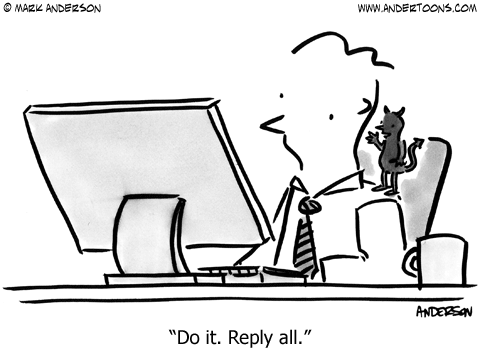I literally despise the concept of e-mail. Every stat you read about it is insanely depressing. It’s a major time suck, and it came along at a time and in such a way that you have a totally-split workforce — you have people that spent the bulk of their career without it (my dad would fit there) and just hung on when it came about, and then you have people who grew up with it and generally “get” how to do things digitally. This is a giant elephant in the room of every company — think of how many companies aren’t even mobile-friendly yet, as a similar example — and even a company like Disney, with myriad resources and people, has trouble figuring out how to take those next digital steps.
Back to e-mail, though. The good thing is that it will die out someday. (Remember: at one point, voice mail was what e-mail is now. And now no one uses voice mail.) The bad news is: that will take a while, because e-mail is easy, people are lazy, and you can hide behind it on tough decisions / things you don’t want to discuss. Basically, it’s a really easy way for people to toss themselves on the cross every now and again. (“Well, I’m just so inundated with these e-mails…”) People make me angry.
Broader problems: everyone’s addicted to e-mail, no one knows how to contextualize their e-mails at all, out-of-office is a total joke, and people need to realize the “push-pull” schism inherent in the space.
Perhaps biggest problem of all? People love to do studies and research about e-mail and breathlessly report the results. And that’s where we find ourselves right now.
Here’s this, via HubSpot. It’s all about trends and ideas within e-mailing. Here’s some “news you can use:”
When writing an email, every word counts. It starts with your subject line: Open rates drop from 24% to 17% on average when subject lines exceed 35 characters. And with mobile email open rates rising more than 300% since April 2011, the case for brevity is more important than ever.
Super logical. Attention spans are in the crapper, and business dudes are always checking their phones in airports. Mobile is all about brevity and simplicity. So this is logical, and you should chase it in your own life. Hell, you shouldn’t ever write an e-mail over five lines.
Now here’s where it gets nuanced. Let’s make some generalizations about generations!
The opposition to verbose emails increases with age: 70% more respondents between the ages of 55 and 64 find the practice unacceptable compared with those between 18 and 24.
Phrased another way: Boomers ain’t got time for that shit. That’s the dragon-slaying generation, baby! Who wants to read a long-ass e-mail? Gotta get on the phone with a client and upsell upsell upsell. Gag.
And of course, there’s this:
Nearly 80% of all respondents find spelling and grammatical errors the most unacceptable offenses.
Basically, this study doesn’t really shed any new light on anything, but … keep it tight, and keep it light. That’ll at least keep people endeared to you.
Bottom line I’d add on all this stuff, BTW? E-mail is the biggest power-tie concept in business. If a high-level person writes a huge subject line and mis-spells everything, no one gives a shit — because they have power. If a low-level person does this, it’s a total fucking disaster that gets mentioned on performance reviews for about six years. “Well, your e-mails aren’t the most professional…” I’ve heard that about 27 times in my life. Most of the time, it’s utter garbage.

Without getting too philosophical, I think a company’s email patterns reflect its operations. How the company communicates through email can be a tell-tale sign of inefficiency, lack of focus, and any number of metrics companies tend to use in various KPIs, blah blah blah.
It’s safe to assume that a company’s internal communications problems radiate out toward its customers — even if it’s subtle. “Brand awareness/equity/mindshare/name du jour” all relate to a company’s message, and if that message is garbled or ineffective by the time it reaches the public, chances are it’s a clusterfuck on the inside.
This Boomer began with Telex, then rode the bow wave of email, and spent 30 years communicating with Asia. The printed word is by definition two dimensional. If you want to express yourself with any degree of depth, as you did in this article, you’ve got to be somewhat verbose. As you were in this article. To a degree that it burned me out before I could bear to finish it. I feel I have to apologize, because you do indeed make sense. Email sucks, and it is indeed the world’s greatest waster of time. But I think you countersunk the nail. 😉
I don’t even know what counter-sinking the nail is, but it overall seems like you liked the post, so… I guess that’s good.